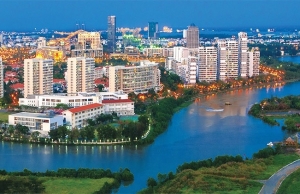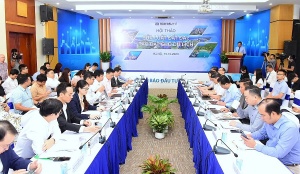Draft revised land law must ensure space for tourism goals
Among those, tourism resources are described as natural landscapes and elements and cultural values, which are the basis for forming tourism products and destinations prescribed in law.
 |
| Dr. Do Thanh Trung, Board consultant Phuc Khang Corporation |
Thus, tourism infrastructure can be understood as accommodation systems and restaurants, shopping centres, souvenir display areas, and amusement and entertainment areas.
According to current land regulations, land used to implement ventures serving tourism purposes belongs to the non-agricultural land group. They are, specifically, commercial and service land used for public purposes (land containing historical-cultural relics, scenic spots, public entertainment, and recreation facilities).
According to the Investment Law 2020 and the revised draft Land Law, methods of accessing land to implement projects include state allocating and leasing land through auction of use land rights, state allocating and leasing land through bidding to select investors to implement projects, and agreement to receive land use rights.
However, in Article 79 of the revised draft Land Law, tourism, entertainment, and recreation projects invested by private capital do not belong to the cases of land repossessed for socioeconomic development for national and public interests.
In addition, mixed-use projects including tourism, entertainment, and recreation functions are not subject to land repossession cases in Article 79 of the revised draft. Furthermore, such projects invested by private capital also are not subject to cases where land is allocated or leased by the state.
According to the revised draft, the state only allocates and leases land through bidding to select investors to implement “commercial housing and mixed-use housing and services projects” but not include tourism, entertainment, and recreation functions.
Thus, investors can only access land to implement these types of projects invested by private capital through an auction of land use rights when the project uses land funds managed by state agencies and organisations in Article 217 of the revised draft Land Law, or agreements to have land use rights as prescribed in Article 128.
However, for large-scale related projects where the land does not belong to the available land specified in Article 217, investors can only access land through an agreement to transfer land use rights with the landowners.
Meanwhile, reaching an agreement with all landowners in a large area of land is difficult because some landowners will not accept the investor’s compensation expenses. Furthermore, that land may be not only occupied by local people but also by speculators. Thus, there may be price hikes pressured by those speculators.
More seriously, Article 128 does not stipulate a mechanism for handling cases in which, if an agreement to transfer the entire land lot cannot be successful, the state will repossess the land and hand it over to the developers.
Therefore, the proposal to add large-scale tourism, recreation, and entertainment projects, new urban area projects with a scale of over 300 hectares, mixed housing projects or new urban areas combined with commercial businesses, services, amusement parks, and multipurpose complexes in the scope of bidding for state repossess is necessary.
In addition, if these types of projects are added to the revised draft Land Law, it will be necessary to clarify what a new urban area is. Because, previously, the 2013 Land Law stipulated that “new urban area construction projects” were in cases where the state repossess land for socioeconomic development for the benefit of the national and public benefit, but there are not any specific and detailed instructions to determine what a new urban area is.
On the issue of amending the conditions for applying the residual methodology to determine land prices according to the provisions of the revised draft, there will be a narrowing of the cases where the residual methodology is applied. This narrowing may cause congestion in land valuation, land use fee calculation, and land rent in certain cases that are not eligible to apply the remaining land price determination measures. This would lead to stalled projects and waste of social resources and budget incomes.
Therefore, the revised draft should consider expanding the application conditions for the residual methodology to facilitate the implementation of tourism, recreation, and entertainment projects.
 | Land rules widened to aid tourism Experts are recommending it is necessary to add types of mix-use housing projects, new urban areas combined with commercial businesses, tourism, entertainment and multipurpose complexes into a revised draft Land Law regulating government land repossession for development. |
 | Proposed land law amendments seek to spur Vietnam tourism Some proposed changes aim to create a dedicated land fund for tourism development, improve land requisition rules, and strike a balance between national interests and the growing tourism sector, promoting infrastructure investments. |
 | VIR seminar addresses Land Law amendments VIR's seminar shed light on the challenges and the importance of well-defined legal frameworks for the tourism and resort real estate market, which currently faces deceleration despite substantial growth. |
What the stars mean:
★ Poor ★ ★ Promising ★★★ Good ★★★★ Very good ★★★★★ Exceptional
Related Contents
Latest News
More News
- An Phat 5 Industrial Park targets ESG-driven investors in Hai Phong (January 26, 2026 | 08:30)
- Decree opens incentives for green urban development (January 24, 2026 | 11:18)
- Public investment is reshaping real estate’s role in Vietnam (January 21, 2026 | 10:04)
- Ho Chi Minh City seeks investor to revive Binh Quoi–Thanh Da project (January 19, 2026 | 11:58)
- Sun Group launches construction of Rach Chiec sports complex (January 16, 2026 | 16:17)
- CEO Group breaks ground on first industrial park in Haiphong Free Trade Zone (January 15, 2026 | 15:47)
- BRIGHTPARK Entertainment Complex opens in Ninh Binh (January 12, 2026 | 14:27)
- Ho Chi Minh City's industrial parks top $5.3 billion investment in 2025 (January 06, 2026 | 08:38)
- Why Vietnam must build a global strategy for its construction industry (December 31, 2025 | 18:57)
- Housing operations must be effective (December 29, 2025 | 10:00)

 Tag:
Tag:




















 Mobile Version
Mobile Version